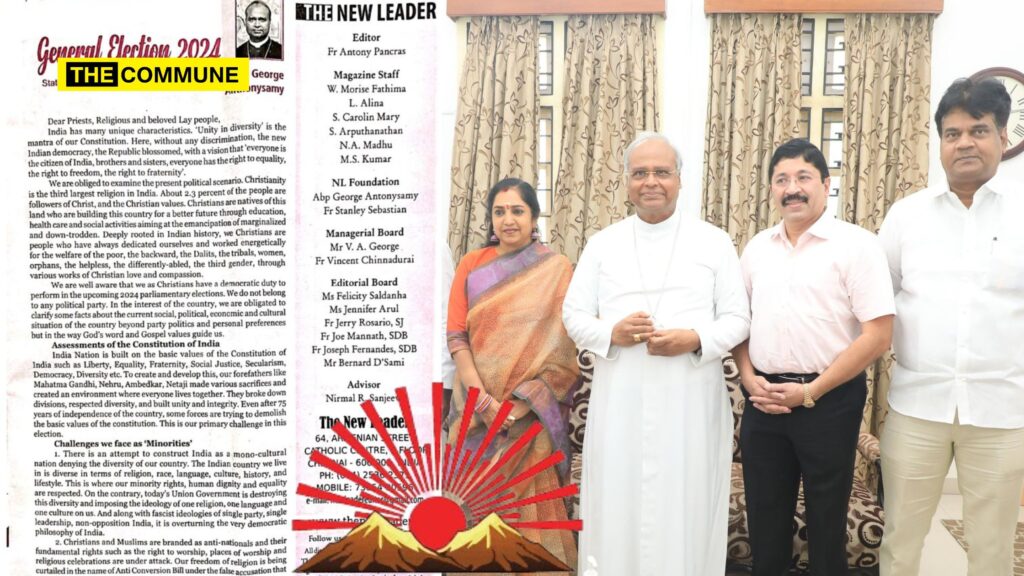The 18th Lok Sabha’s first session is scheduled to commence from 24 June 2024, and will run until 3 July 2024. Parliamentary Affairs Minister Kiren Rijiju announced on 19 June 2024, that the Rajya Sabha session will start on 27 June 2024. He also urged all political parties to engage in constructive debates during the upcoming session.
Against this backdrop, Members of Parliament Dayanidhi Maran from Central Chennai, Thamizhachi Thangapandian from Chennai South, and Kalanidhi Veeraswamy from Chennai North visited George Antonysamy, the controversial Archbishop of the Archdiocese of Madras-Mylapore. Archbishop Antonysamy had recently been accused of attempting to influence voters using religious sentiments during the concluded Lok Sabha elections in 2024. The DMK MP’s faced criticism from the netizens.
#Photos | சென்னை சாந்தோம் மறை மாவட்ட பேராயரிடம் வாழ்த்து பெற்ற திமுக எம்.பி.க்கள்!#SunNews | #DMKMPs | #Santhome pic.twitter.com/vcWWhNApkq
— Sun News (@sunnewstamil) June 21, 2024
During the recent 2024 Lok Sabha elections, a complaint was raised by the Legal Rights Protection Forum (LPRF) on 29 April 2024, to the Election Commission of India (ECI) regarding the Tamilnadu Bishops’ Council and Archbishop of Mylapore – Madras Archdiocese, George Antonysamy, for allegedly propagating written propaganda through a community magazine to sway voters in the 2024 Lok Sabha elections, the ECI has acknowledged the complaint. Subsequently, the ECI has acknowledged the complaint and instructed the Chennai District Election Officer to address the issue of influencing voters along communal lines.
Archbishop George Antonysamy had penned an editorial titled “General Election 2024: Statement from Tamil Nadu Bishops’ Council” in a recent edition of The New Leader magazine, invoking religious sentiments and employing fear-mongering tactics. In the editorial, Antonysamy openly criticized India’s elected central government (BJP) and its citizens. He had suggested that there was an attempt to construct India as a mono-cultural nation, denying its diversity. He had accused the Union Government of imposing the ideology of one religion, one language, and one culture, along with fascist ideologies.
Antonysamy had further stirred disharmony by alleging that Christians and Muslims were branded as anti-nationals and their fundamental rights were under attack. He had criticized the government for attempting to impose communal laws and curtail religious freedom. He had also expressed concerns about various issues including media control, neglect of southern states, attacks on state rights, and alleged government control over investigative bodies and courts. The editorial had concluded with a call to action urging Christians to vote to protect religious faith and human rights, rejecting sectarian parties, and aligning with non-religious, democratic forces.
The editorial’s tone and content had suggested a possible alignment with a political party, specifically the DMK, based on its language and echoed claims. Concerns had been raised about its attempt to influence voters based on religious lines, which could have violated the democratic process. Several organizations affiliated with the Archdiocese of Madras-Mylapore had been highlighted, indicating the need for a thorough investigation into potential violations of FEMA, PMLA, and FCRA regulations. Allegations had been made about the misuse of FCRA funds for purposes contrary to donor intentions, including political agendas.
Various organizations, including the Legal Rights Protection Forum (LRPF), had raised the issue with the Election Commission of India, urging decisive action against the Bishop’s Council and the Archdiocese of Mylapore-Madras. There had been demands for investigation and accountability for violating laws and misusing funds.
Subscribe to our channels on Telegram, WhatsApp, and Instagram and get the best stories of the day delivered to you personally.

